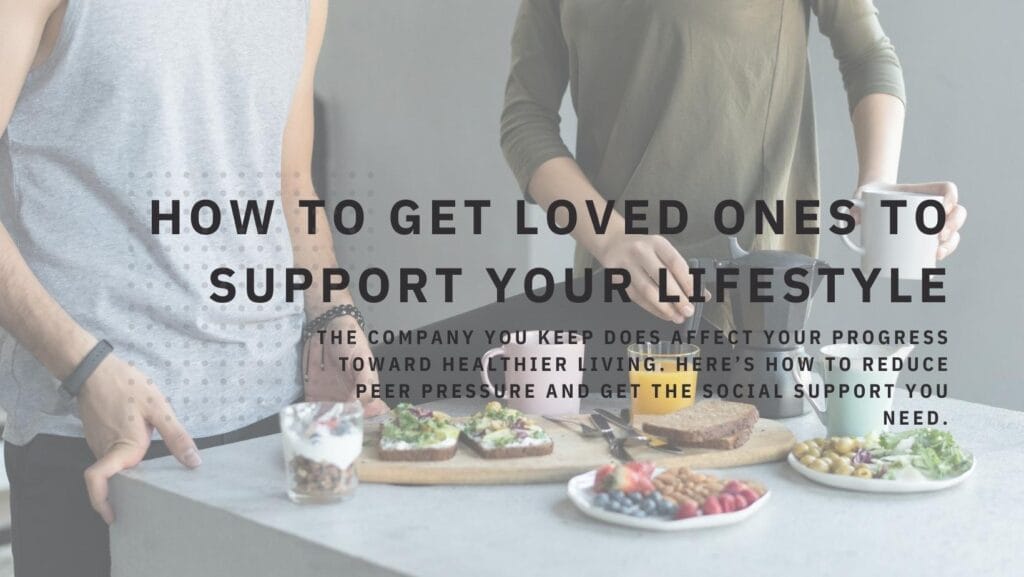Changing your eating and exercise habits is hard enough. Getting loved ones to support your healthy lifestyle changes? Prepare to grit your teeth. The company you keep does affect your progress toward healthier living. So here are some ideas on how to reduce peer pressure and get the social support you need!
It is hard to eat and move in ways that support your own health goals when, in your social circle, Fridays mean beer and pizza; Saturdays mean bottomless brunch & Prosecco; hanging out means getting coffee and cake.
Just “do you”.
Change is difficult.
In order to overcome the many bumps, blocks, and blusters inherent to significant lifestyle change, we need to be anchored to a deep, internal, personalised “why” that will pull us through.
You can’t manufacture this type of motivation for someone else. No matter how hard you try to coerce your kids, spouse, parents, and friends to change, they may have none of it.
And in fact, that may be a good sign. Because that means they know that in order to make the kinds of changes you’re making, they have to want it too.
We call this “intrinsic motivation” — a connection to one’s own, internal reasons for doing something. Research shows that intrinsic motivation leads to change that’s longer-lasting and more self-sustaining than extrinsic motivation, which is based on the desire to obtain external outcomes such as good grades or the approval of others (ahem).
Intrinsic motivation requires deep thought and reflection, and may take longer to develop.
So respect that your loved ones may take time to connect to their own reasons for eating and moving better.
Meanwhile, just “do you”.
Focus on your own intrinsic motivations. Stay connected to what’s driving you, deep inside, to make these personal changes.
Without ignoring your natural love and concern for loved ones, let your attention turn inward. Spend more energy on your own growth and development.
Which could lead to something else amazing…
Think about how you feel when you watch someone you love work toward a BIG goal with heartfelt determination, grit, and bravery.
Think about how you feel when you watch that person persist despite setbacks, failures, and fears.
Think about how you feel when you watch that person triumph, however messily and imperfectly, over adversity.
You feel inspired.
You feel like anything is possible.
You feel like maybe you could do something great too.
And that is the beautiful irony in “doing you”:
By working toward and achieving a healthier, happier, more confident and capable version of yourself, you become the inspiration, the positive influence to your family and friends.
And it all comes full circle when that little healthy-lifestyle wave you started attracts other riders, builds, and then becomes a huge tidal of momentum to carry you to your final objective — a fit, healthy you — and keep you there.
Influence happens in both directions, remember?
Lead the way.
Use “approach” goals instead of “avoid” goals.
To foster understanding among you and loved ones, play with the language you use to (gently) coach them.
“Avoidance” goals — such as “stop eating junk food”, “don’t watch TV after dinner”, and “don’t overeat” — are more likely to make people feel restricted, rebellious, and resistant.
“Approach goals” — such as “try two new vegetables this week”, “eat three different colors of plants today”, and “do something that gets you out of breath for 20 minutes” — are more likely to make people feel expansive, creative, interested, and willing.
Approach goals help make the process of change more harmonious, positive, and even fun for you and your family.

Find objective support that’s just for you.
Having a support person that is detached from your social bubble can be tremendously helpful.
A skilled nutrition and fitness coach provides an objective perspective and functions as a sounding board, a voice of reason, and a resource for practical ideas and inspiration — a source of momentum.
An experienced coach can also provide accountability, which is especially important if you are the lifestyle “trailblazer” in your social circle.
Check your motives.
Each time you make a decision about food or exercise (or any other health factor you’re trying to improve) ask yourself:
Am I doing this because everyone else is doing it, or because it matches my own internal intentions and values?
This doesn’t mean it’s wrong to want to do what other people are doing. But if you do go the way of the crowd, do it consciously.
Involve your loved ones.
Small moments of support can make a huge difference when you’re trying to move away from friction, toward momentum.
So:
- Ask your spouse to help you stretch out after a workout, or to accompany you on a morning walk.
- Ask your children to help you menu plan, choose vegetables at the grocery store, or even help prepare a meal.
- Ask your best friend for a hug when you’ve had a stressful week.
- Ask your friends and family to cheer you on at a race.
- Trial new activities together. Invite friends for a walk outside! A dinner party at home! A new activity together!
Involve and integrate your social network, into your life, without forcing them to change themselves.
Accept them as they are, and be sure to tell them how much it means to you that they are there for you.


